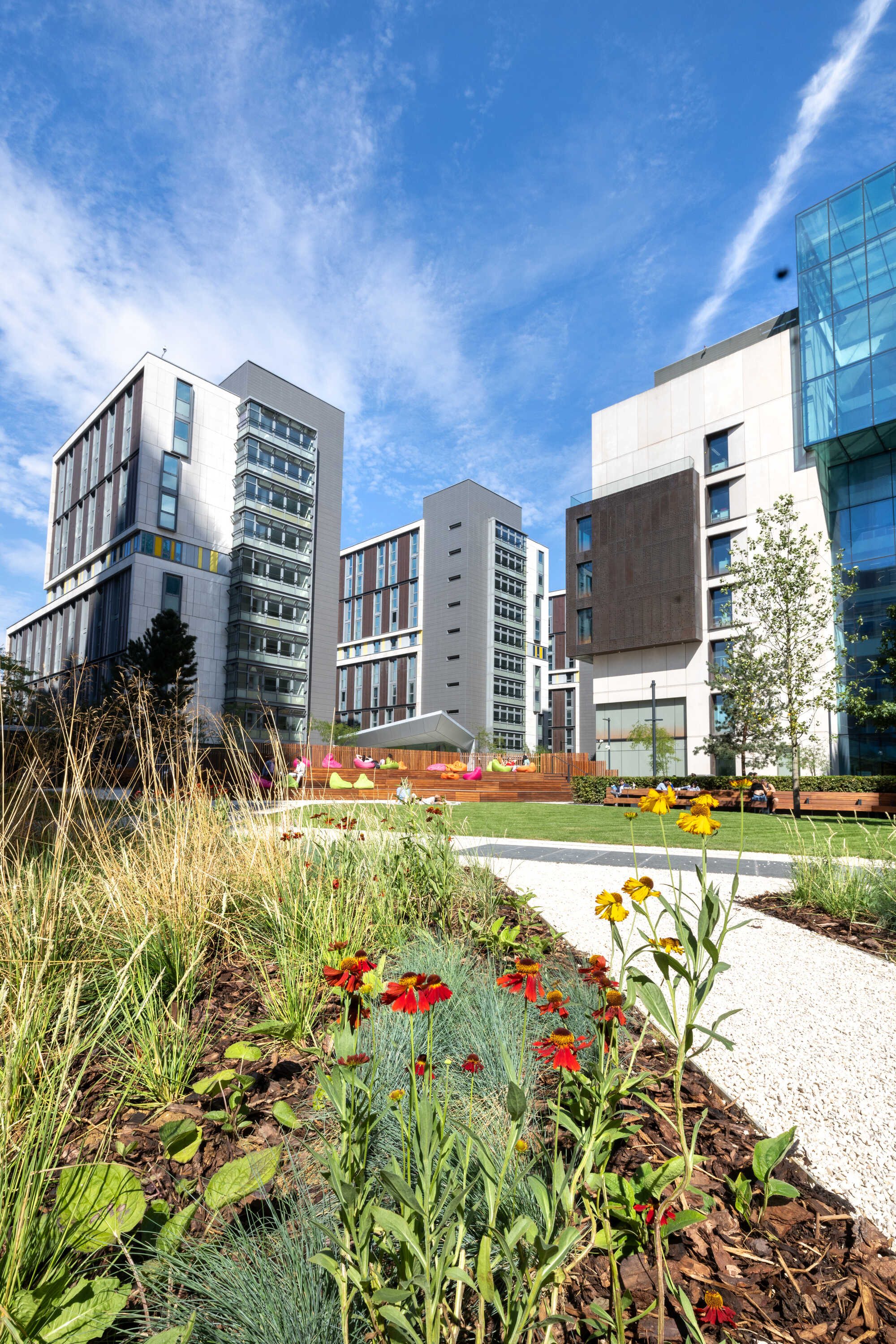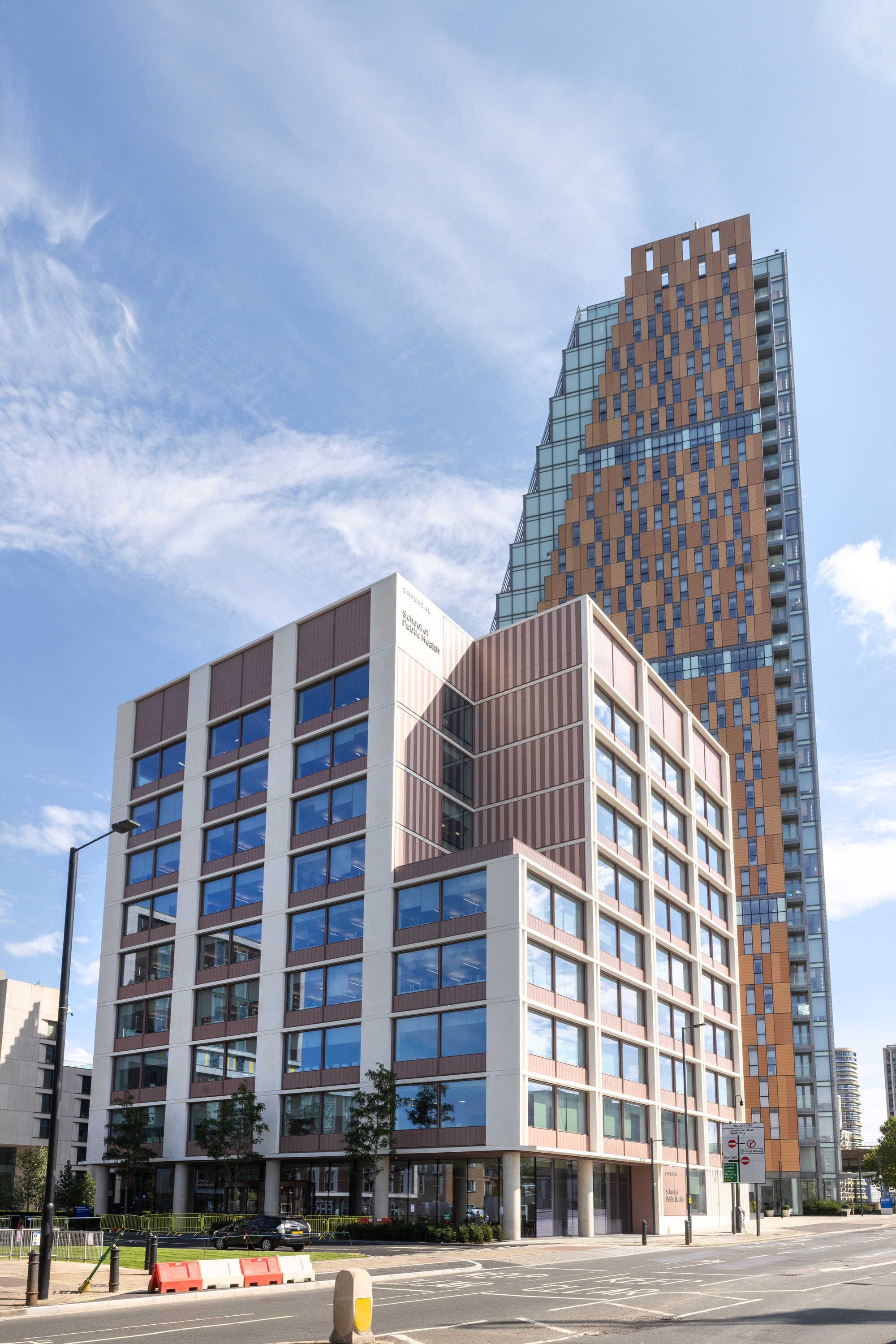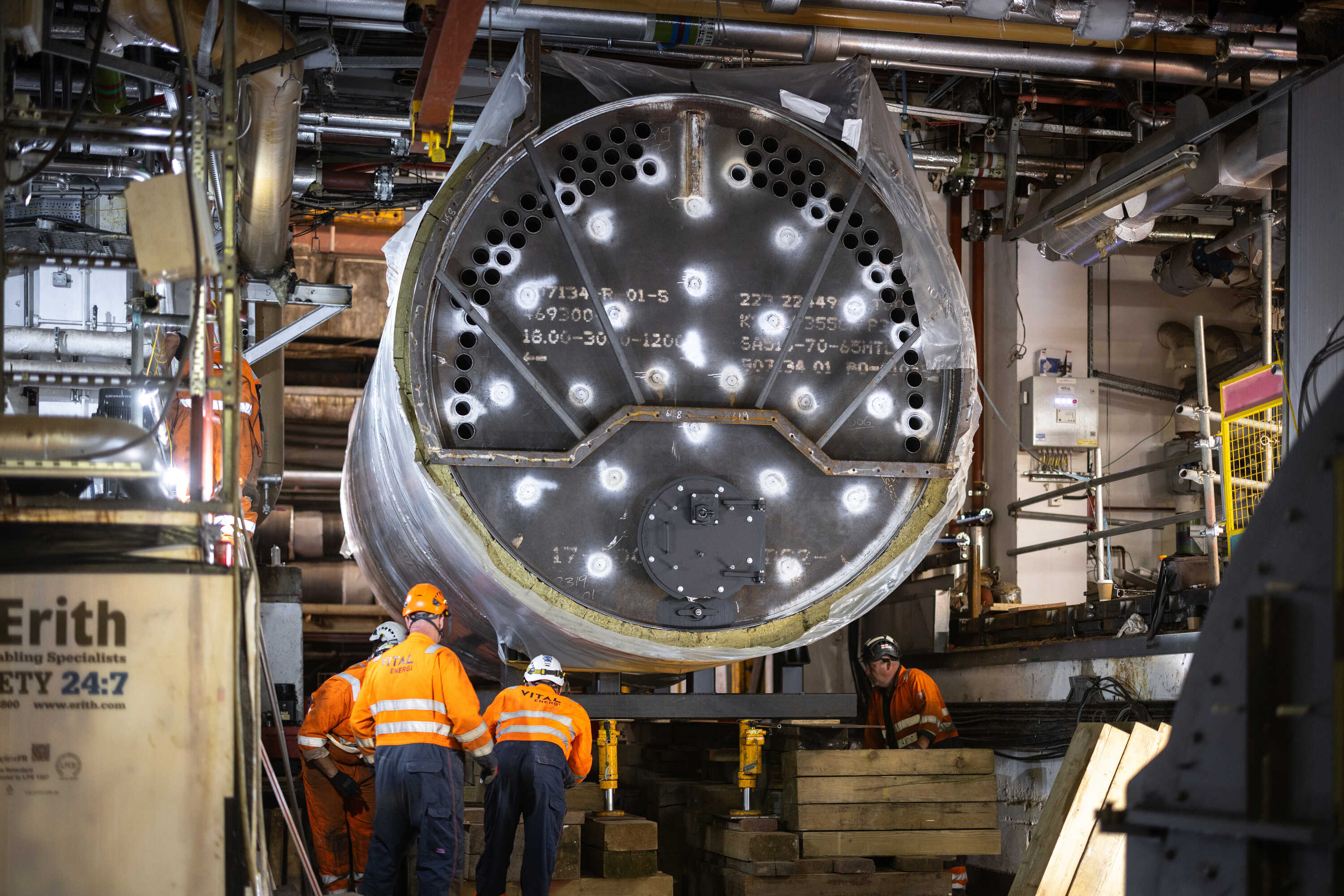In our strategy, we outline plans to establish Sustainable Imperial as our University-wide approach to sustainability matters by 2025. This will deliver evidence-based solutions, embrace new technologies, challenge conventional thinking and open new debate in our efforts to solve this growing global crisis.
In spring of 2024 we launched our latest milestones, which coincided with Imperial becoming one of the first universities to sign up to the Concordat for the Environmental Sustainability of Research and Innovation Practice. This voluntary concordat aims to deliver innovative research in the UK that is environmentally responsible and beneficial to the sector. Our signature recognises our ongoing commitment to sustainable research.
Progress on reducing emissions
Our carbon emissions are measured against scopes 1, 2 and 3. The figure on the next page summarises how Imperial’s activities lead to carbon emissions and how these are classified by scope.
Our scope 1 and 2 emissions decreased by 17% compared to the previous year. Our overall scope 1 emissions reduced this year due to the temporary shutdown of the Combined Heat and Power (CHP) plant on the South Kensington Campus while the heat exchangers were replaced as part of the programme to remove the steam heating network and move to a hot water network only. This led to a decrease in the use of natural gas use by the CHP. Additional grid electricity was purchased, causing our scope 2 emissions to increase. We expect to see a partial rebound in scope 1 and decreased scope 2 footprint next year as the CHP engines return to use at South Kensington but an overall benefit from increased CHP efficiency and heating efficiency from the removal of the steam network.
Our scope 3 emissions have continued to increase since 2021 and grew 7% during the year. Procurement accounts for nearly 50% of these emissions and travel accounts for 48%. Our sustainable procurement and travel policies that were approved this year will help us build a stronger approach to reducing these emissions, working alongside teams to embed these policies into everyday operations.
Further information on our carbon emissions and how we are working to achieve our carbon net zero objectives can be found in our Sustainability Report for the 2023–24 financial year.
“We are committed to helping lead the change needed in the research sector, and more widely, through our operations, partnerships, research, and teaching.” Professor Hugh Brady, President, Imperial College London (from letter of commitment to the Concordat)
Carbon annexe
Scope 1 (direct)
- Combustion of fuel in University facilities
- University vehicles
Imperial College London
Scope 2 (indirect)
- Purchased electricity for University use
Upstream activities
Scope 3 (indirect)
- Transport and distribution of goods
- Employee homeworking and commuting
- Water
- Business travel
- Waste
- Purchased goods and services
- Fuel and energy related
- Leased buildings and vehicles
Upstream activities
Scope 3 (indirect)
- Student accommodation
- Student commuting
- Investments
- Leased buildings and vehicles
Downstream activities
Overview of Imperial's scope 1, 2 and 3 emissions
|
Scope |
2023–24 emissions (tCO₂e) | 2022–23 emissions (tCO₂e) | Percentage increase/decrease |
|---|---|---|---|
| Scope 1 |
19,538 |
36,792 | -47% |
| Scope 2 | 22,874 | 14,192 | 61% |
| Total Scope 1 & 2 | 42,412 | 50,984 | -17% |
| Scope 3 | 201,174 | 187,722 | 7% |
Our lab sustainability is taking off
As a specialist STEMB university, we have a significant number of labs at Imperial – more than 1,400 across all our campuses. With labs using ten times more energy and four times more water than regular office spaces, we need to ensure they do not get left behind in our sustainability journey. That’s why we’re rolling out laboratory efficiency schemes. These programmes provide practical steps to make lab practices more sustainable, with the knock-on effect of reducing carbon footprint. We’re currently enrolled in two schemes: the Laboratory Efficiency Assessment Framework (LEAF) is an environmental accreditation scheme to improve sustainability in higher education teaching and research; and the My Green Lab Certification programme gives laboratories acptionable ways to improve environmental performance.
People power: embracing our Sustainability Strategy

It’s not just physical interventions that will help us achieve our goal: staff and students across the institution need to be on board, too. Green Impact is a UN award-winning programme that’s run internationally by students. We have tailored the programme to align with our Sustainability Strategy and carbon net zero goals and launched our Green Impact platform in February.
The interactive platform is a toolkit of activities to help teams improve sustainability across Imperial, from waste and recycling to travel and procurement. Staff and students also enjoyed interactive engagement during Sustainability Fortnight in February 2024. This year’s themes included Climate Action and Justice, and Sustainable Campus, with events ranging from panel discussions and lectures to lab sustainability workshops and climate cafes.
Working more sustainably
We are taking steps to make our operating practices more sustainable. Last year we launched our Sustainable Food and Drink Policy and our catering outlets have been busy working towards the targets we set out. We’re already ahead of our timetable to remove beef from all our menus, and only serve fish that is Marine Stewardship Council (MSC) certified. Non-dairy milks are now free across all our catering outlets and seasonal fruit is offered, where possible, in preference to non-seasonal fruit, to save on food miles.
During the year, we published our new Sustainable Procurement Policy. Procurement activity accounts for approximately half of our scope 3 emissions. This highlights the significant impact that our purchasing decisions have on our overall carbon footprint and underscores the importance of integrating sustainability into our procurement processes.
Imperial will use its influence with suppliers and partners to procure environmentally friendly supplies and services. This is aimed at reducing consumption and, wherever possible, purchased goods and services that are manufactured, used, and disposed of in an environmentally responsible way. Our new policy requires a 20% sustainability weighting in the tendering process for major procurements, while smaller procurements will have a 10% sustainability weighting.
We have also published our Sustainable Business Travel Policy. The policy is designed to transition travel to be more sustainable by making ‘climate-conscious travel’ our default. That means using virtual collaboration wherever we can, focusing on quality over quantity of travel, and using trains not flights wherever the journey can be done within five hours. Our sustainable policies and reports are available to read on our website.
86%
We have already reduced beef on our menus by 86% since 2017.
850k
Plastic cups saved annually.
Imperial Zero Index
This year saw the launch of the Imperial Zero Index, a groundbreaking framework that guides our interactions with energy and fossil fuel companies. This progressive tool allows us to assess our collaborators’ annual performance in their commitment to achieving carbon net zero emissions by 2050. We prioritise partnerships where our research directly contributes to decarbonisation efforts and our partners demonstrate a credible strategy to reach carbon net zero. This ‘engagement for change’ ethos ensures our research actively contributes to a sustainable future. Imperial expects to disengage from academic and research collaborations with companies that score poorly against its criteria. The Index will also be used to inform our investment decisions.
Governance
Imperial's governing and executive body, the Council, monitors how we are responding to climate-related risks, identified through the University’s risk management processes and supported by the Audit and Risk Committee.
Our Sustainability Strategy Committee, a sub-committee of the University Management Board (UMB) is focused on turning our sustainability goals into reality. This committee includes a representative from every faculty, as well as from relevant operational teams, and students’ union, trade union and education representatives. In addition, all Board papers and business cases must now routinely set out their sustainability implications.
The committee is supported by working groups, including a group of leading academics who are helping us find innovative solutions. Individual faculties also have their own sustainability champions making a difference across the University. In 2023–24 the committee focused its work on the following areas:
- Reviewing the Decarbonisation Programme for the University estate;
- Developing the Sustainable Procurement Strategy, Policy and Toolkit;
- Recommending the University sign up to the Concordat for the Environmental Sustainability of Research and Innovation Practice;
- Developing the Imperial Carbon Budget Model;
- Reviewing Imperial’s detailed breakdown of its Scope 1, 2 and 3 carbon emissions;
- Driving up Laboratory Efficiency Assessment Framework (LEAF) take-up across the faculties of Medicine, Engineering and Natural Sciences, to reduce carbon footprints and improve sustainability of individual labs; and
- Supporting the development of Green Impact, the toolkit to increase sustainable activities.
Further information on the University’s approach to climate-related risk can be found in the Risk Management Framework.
Developing our campuses

We are continuing to invest in our White City Campus with a pipeline of projects focused on creating the best environment for great ideas to grow. This year saw the new School of Public Health being opened by Professor Sir Chris Whitty, the Chief Medical Officer for England. The building provides a mixture of flexible research, teaching, and community spaces where the School’s scientists, researchers and students will come together to tackle the world’s biggest public health challenges. This new home for the School of Public Health is an important milestone in the Faculty of Medicine’s strategy to bring more of its activity together in White City Innovation District. With this building completed, there was a break in construction activity that allowed us to plant a garden square that opened in September 2024 to provide a green haven for all.
We have now begun the next phase of delivering the part of the campus that is south of the Westway, a major road running through the campus. The first step is a major infrastructure project to enable the development of the site. A key part of the project is the construction of a new landscaped bridge over the Central Line, which will become the new main entrance to the campus. The structure of the new bridge is now in place with ten 28-tonne beams having been installed over live railway tracks. The first section of the bridge will open in autumn 2024 with the full bridge to be completed by summer 2025.
We have submitted a planning application for two buildings under the Westway that will link the north and south of the campus together. These buildings aim to bring character and vibrancy to this important connection point with places for people to gather, collaborate and relax. Looking forward, we are developing plans for a new flagship interdisciplinary academic building and additional commercial space for collaborators to join and expand within the White City Campus.
Fossil fuel-free building
We are transforming Hammersmith Campus’s Clinical Research Building into Imperial’s first fossil fuel-free building. The redevelopment will house the National Heart and Lung Institute and includes upgrades like new labs, improved office spaces, and a complete overhaul of the building’s infrastructure for sustainable heating, cooling, and power. This project is expected to be completed by autumn 2024.
Decarbonising our estate

To achieve our carbon net zero goals we are making significant investments to transform our campuses and working practices. At our South Kensington Campus, we have completed work on a major project to remove central steam generation, reduce energy use, carbon footprint and emissions. This project removed a significant amount of legacy steam-generating infrastructure. The 60-year-old steam network and 25-year-old boilers have now been removed and three new boilers were delivered to campus in August 2023.
Initial steps, to be taken over the next five years, include improving how our building services plant is controlled. We have already started replacing lighting with energy-saving LED lights and are committed to phasing out gas for heat and power across our campuses by 2040.
We will also explore opportunities to generate renewable energy, such as rooftop solar panels on suitable buildings. This is due to start at Silwood Park Campus, where optimum conditions for solar harvesting could help generate up to 11.3% of the campus' needs.
We are committed to ensuring all new buildings and major refurbishments meet high environmental standards such as Building Research Establishment Environmental Assessment Method (BREEAM) and other certificates from 2023–24 onwards. Current projects include the recently opened School of Public Health, and the Sir Alexander Fleming Building’s Department of Infectious Disease, which is on track to meet BREEAM Very Good target.
